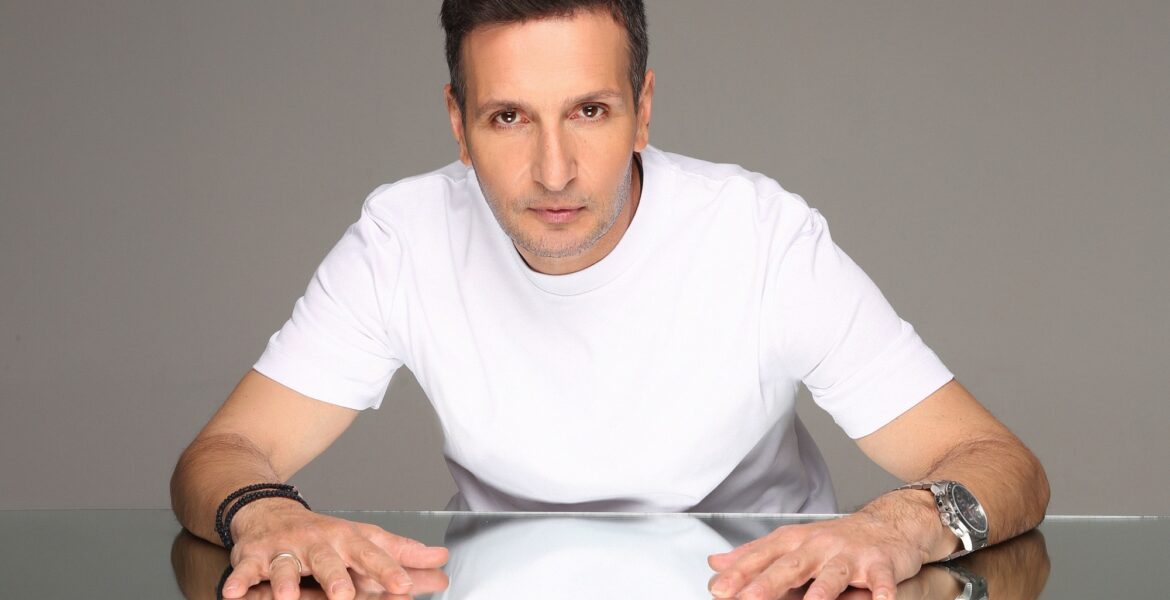Greek singer Dimitris Basis was born in Stuttgart, Germany, where his parents had emigrated for a few years. He first moved to Greece at the age of eight, when his family returned to Chersos village in the prefecture of Kilkis. At the age of twenty, he started singing professionally and was discovered by Stamatis Kraounakis and the Warner Records Company, with which he signed a contract. For three consecutive seasons, he collaborated with Alkistis Protopsalti and Stamatis Kraounakis and Lina Nikolakopoulou in musical performances under the direction of Andreas Voutsinas.
Basis's debut was made in the "When My Friends Come" performance by Stamatis Kraounakis, in which he sings two songs and the soundtrack "The Third Wreath", who sings one song. In 1996, he collaborated with Christos Nikolopoulos and Yiannis Spanos at live concerts. In 1987, he released his first personal album titled “Me Ti Fora Tou Anemou” of music by Christos Nicolopoulos and Costas Falkonis and lyrics by Christos Papadopoulos.

Without further ado, let's jump into Dimitris Basis's recent conversation with Greek City Times.
What motivated you to start singing?
I loved music from a very young age. I grew up in a house where my parents listened to a lot of music and mainly folk music. My parents were immigrants in Germany and they listened to the songs of their time; songs of Stelios Kazantzides, Stratos Dionysiou, Gregoris Bithikotsis and many songs that made them mentally travel nostalgically back to Greece, since this was their only consolation by being in a foreign country.
I was eight years old when we returned to Greece permanently. My grandmother sent me to church because I liked to attend church and be the altar boy, hence I discovered the magic of Byzantine music from the cantor of our village, and this was the first stimulus I had with music.
I started taking Byzantine music lessons and somewhere in my teenage years, I started studying music and discovering the singers of my time, such as George Dalaras, Charoula Alexiou and Eleni Vitali. I passionately loved singing and little by little the desire began to flare up inside of me, that was what I really wanted to do in my life; to deal with music and singing. That's how it all began.

Do the decisions you make every day, even at a professional level, have a direct impact on your family?
Clearly, my professional decisions are directly related to my family. When you have a family, you have to find the balance between family and career. My family supports me in my professional career as I try to find the balance between my work and family to make their lives better.
You have been successfully performing folk music for twenty-five years now. Do you believe that folk music is our roots and speaks to our hearts?
Yes, I believe that folk music is in our roots; it is what flows in our veins and in our DNA. It doesn’t matter how many years have passed by, when you listen to the folk music that leaves you a strong imprint, you immediately feel what you listen. It is something that touches you; it is something that concerns you even though this song was written many decades ago. This is folk music; it is the one that speaks directly to our hearts even though many years have passed since it was written.
It is not a coincidence that in the evolution of music, modern composers and lyricists are always influenced by previous composers and being influenced by them.
Some collaborations succeed and some don't. Which ones do you remember gracefully during your artistic career?
Collaborations are about the chemistry of two artists working together at a given moment and sharing the same stage or dance floor.
I have done so many collaborations and almost all of them have been successful. But I single out some in particular because they really left their imprint on the specific artistic events.
These are, my collaboration with Dimitris Mitropanos - a collaboration that lasted almost 10 years with some short hiatus in between, my collaborations with Mikis Theodorakis and the Mikis Thodorakis Orchestra, Charoula Alexiou, Eleni Vitali, Yiannis Kotsiras, but also many other collaborations that each have left something special in my heart.
What is the musical imprint you want to leave on the history of Greek music?
It's a long conversation to talk about myself and whether I want to leave an imprint on the history of Greek music. The term "history of Greek music" carries the gravity and seriousness of our culture.
I will let time take its course whether my musical journey and my songs deserve to leave their own imprint on what we call the "history of Greek music". I could only tell you that what I would really like is for some of my songs to endure the test of time and be timeless that will be heard and sung by future generations. Time will add value or not.
In the past, artists were granted a reputation by the sales of their CDs. Today, with digital platforms and online promotion, how much does it help artists to promote their music?
Time changes, technology evolves, CDs and vinyl records became obsolete as sales go ahead in our days. Artists must adapt to this new era. Today artists are valued not only by the number of sales but also by the views their songs have on YouTube, Spotify and the online sales of digital recordings.
Music production has not ceased but sales are now digital. And the dynamics and success of the songs are judged, depending on the views on YouTube. Therefore, the criterion for judging the dynamics of an artist still exists today. It's just that the tools are different.
Now back to the question of whether this could help an artist or not, the answer is that the artist must adapt to the new era and become technologically savvy if he wants to have his songs playlisted.
Different genres of music are mixed and remixed. To what extent do you think that folk music will endure this competition in the course of time?
Folk music will pass successfully the test because as we said at the beginning of our conversation, folk music is in our genes. It is this kind of music that is an inspiration for the evolution of other genres of music over time. Let's not forget that even today, in all successful music programs, if they want to raise the ratings, they playlist or present folk music, which often makes a fundamental difference in and culminates the musical program.
Do you think that music is deprived of quality since there aren’t any good lyrics yet?
No, I believe that good songs are still written today in terms of lyrics. Life goes on. There is not only the past, there is the future and we must move forward.
Is there a music industry in Greece and under what conditions could it be evolved and allow Greek artists to have access to the international music scene?
The music industry exists in Greece because life goes on. It just exists in another way, as we said before. Music is online; has a digital form and there is no cd or vinyl. But the production of the songs exists, so there is a discography in Greece. And because the means of promoting and promoting these songs is now digital, access to the international music scene exists, since the internet has no borders.
But what makes the difference for Greek artists in the international music scene, I believe, is the language. The Greek language has a small share in the international market.

What are your future plans?
Our immediate future plans are a big summer tour throughout Greece and abroad, starting now in June, together with the legendary band "EKINOS & EKINOS" and Calliope. In addition, I will participate as a special guest at specific concert venues in Northern Greece, along with Matthaios and Konstantinos Tsachouridis.


